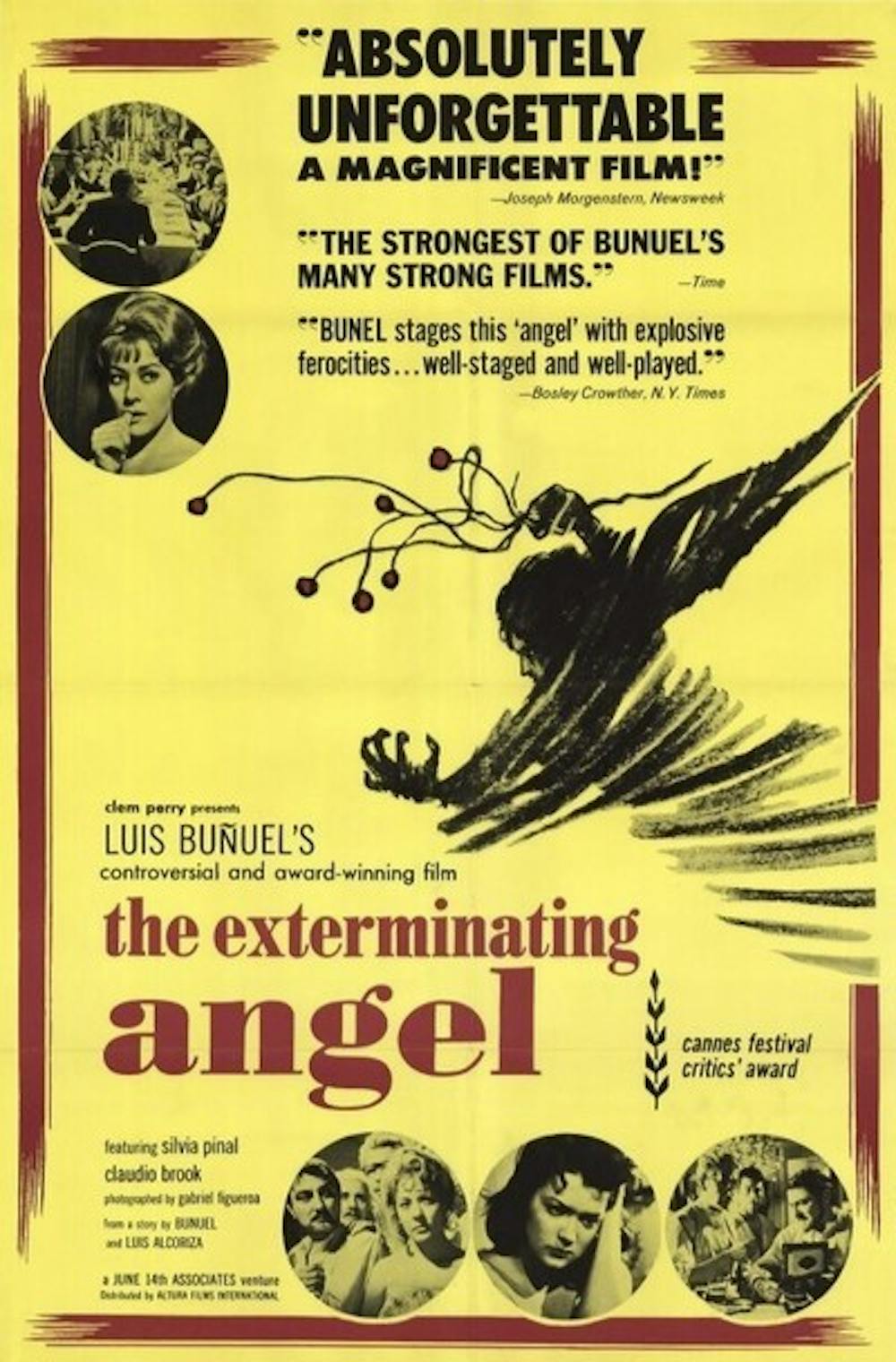“Midnight in Paris” (2011) has a film buff in-joke near the end. After a bar room chat with Salvador Dalí (Adrien Brody), time-traveler Gil Pender (Owen Wilson) gets up to leave. At the door, Gil notices a young man: Luis Buñuel, the Spanish surrealist filmmaker. Gil suggests to Buñuel an idea for a movie: “A group of people attend a very formal dinner party, and at the end when they try to leave the room, they can’t.”
Thus unravels the plot of “The Exterminating Angel” (“El ángel exterminador”), Buñuel’s 1962 existential thriller. And boy, oh boy does it all seem a little too familiar: A bunch of friends get trapped in a lounge by an invisible force that induces lethargy, and can even bring on severe illness. In quarantine, the characters begin to get on each other’s nerves, turning emotional thumbscrews with glee. It’s “social distancing” à la Chekhov if Chekhov had ever written a story where an undead severed hand crawls around sofas, looking for throats to strangle (yep, that happens).
The story takes place in post-war Spain. The first scene, we watch a large group of friends arrive from a play, “The Virgin Bride of Lammermoor.” We get a good idea of their social class: The men wear top hats and tails, the women luxurious gowns. They’re entering a mansion, filled with chandeliers and candelabras. The household’s background is equally idyllic: palm trees sway over a black security gate, the street is clean.
But, for some reason, the household’s domestic servants have a dark premonition. They hurry away after preparing dinner for homeowners Edmundo (Enrique Rambel) and Lucía Nóbile (Lucy Gallardo). After coffee, the partygoers dance to Chopin’s Waltz in E Minor, smoke a billion cigarettes, gossip. So far, so good. Pianist Blanca (Patricia de Morelos) plays a final piece, then descends the keyboard cover. That’s when the guests matter-of-factly throw down their dinner jackets and relax. Some fall asleep onto the parlor room’s sofas, others the floor. No one even discusses leaving the mansion. The lights go off.
The proceeding hour of “The Exterminating Angel” is some of the most bonkers stuff I’ve seen on any screen, a spectacle that even rivals Joe Exotic’s Oklahoma gubernatorial bid in episode five of “Tiger King.”

Buñuel gradually shows us that there’s no escaping this Coffee Room of Death. Almost interchangable characters confess their love for each other, plot murder and commit suicide. The black-and-white cinematography and monotone costume designs make it incredibly hard to distinguish almost any of the film’s twentyish characters from one another. The men, all slightly pudgy, suddenly break out into fights with each other; their wives, clad in high heels, sacrifice sheep in rituals that are meant to extricate the guests. Buñuel even has entire lines of dialogue repeated verbatim, so that our sense of time lags, and even has entire lines of dialogue repeated verbatim, so that our sense of time lags. It eventually seems as if we, too, have always been locked-up in the parlor room. It’s a relief when “The Exterminating Angel” starts exterminating: at least there are fewer characters to keep track of. Two characters meet their ends when they walk into a closet that somehow squeezes its visitors into a bloody pulp. One supposes that Mr. Tumnus and Aslan the Lion don’t live in that particular wardrobe.
But it’s the history behind “The Exterminating Angel” that’s most fascinating. Francisco Franco, the right-wing authoritarian dictator who took power in Spain after a brutal civil war, still headed the government in 1962. You can spot elements of Francoist Spain in “The Exterminating Angel.” During the dinner party, a servant carrying a silver platter trips, falling face-first onto the floor. The white-tied guests roar with laughter, and no one helps him get up. Later on, a woman in the kitchen throws an ashtray through a window. A crash resounds. “What was that?” another woman asks in the parlour room. “Just some Jew passing by,” says her husband. After the surviving partygoers escape, they try to absolve their sins by going to a mass. Buñuel never mentions Franco by name, but there are still plenty of hints about the Nationalist leanings of the film’s characters.
With this context in mind, there's more than a little comeuppance when our “heros” descend into a topsy-turvy hell. Watching “The Exterminating Angel,” I was reminded of an early scene in Quentin Tarantino’s “Inglourious Basterds” (2009). The players: Sergeant Donny Donowtiz (Eli Roth), a captured Wehrmarcht officer named Wilhelm (Gedeon Berkhart), and, most importantly, a baseball bat. Tough luck, Wilhelm.
Reel Critic: 'The Exterminating Angel'

COURTESY PHOTO/BARCINO FILMS
Comments



